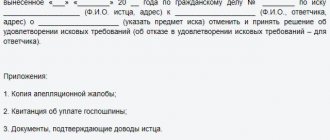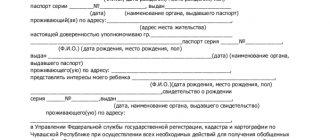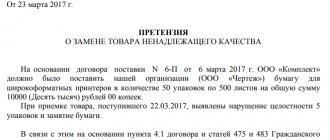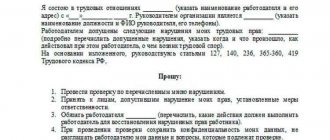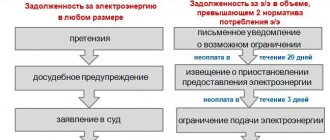A notarized power of attorney to represent the interests of an individual is a document confirming the authority to enter into transactions with state registration or representation in court.
Not all legally significant actions can be performed by a person personally. Sometimes he cannot do this physically (for example, he is far away or sick). And sometimes he does not have enough competencies (for example, to participate in a trial).
In such cases, it is better to delegate the relevant authority to a loved one or a lawyer. A power of attorney from an individual to represent interests allows you to do this officially. We will look at how to draw it up correctly and when the participation of a notary is needed.
○ Power of attorney to represent an individual
Citizens have the right to conduct their cases in court in person or through representatives. Personal participation in a citizen’s case does not deprive him of the right to have a representative in this case. 1 Art. 48 Code of Civil Procedure of the Russian Federation .
Thus, an individual can transfer the right to represent his interests in court through a power of attorney. The authorized person may be an ordinary citizen when it comes to civil proceedings.
In administrative matters, a power of attorney is issued to a specialist with a higher legal education.
In accordance with Art. 51 of the Code of Civil Procedure , the interests of an individual in court cannot be represented by judges, investigators and prosecutors, except in situations where they participate in the meeting as representatives of the relevant authorities or legal representatives.
Note!
A power of attorney does not confer obligations on the authorized person, so his consent to the execution of the document is not required.
Who can act as a principal
Any individual who has full legal capacity can be trusted to represent their interests. A minor under the age of 14 or a mentally disabled person who is unable to account for his actions has no right to act as a principal. And this is logical.
It is also acceptable to apply to a notary for a group of citizens who have agreed to transfer their powers to one of them or a third party.
Minors between the ages of 14 and 18 have the legal rights to issue a power of attorney if they have emancipated status.
This happens when a teenager:
- enters into a marriage relationship registered by the Civil Registry Office in the prescribed manner;
- engages in labor or entrepreneurial activities and acquires full legal capacity in compliance with the requirements of Art. 27 Civil Code of the Russian Federation.
Remember! A citizen with limited legal capacity can only trust others to carry out small everyday transactions: purchasing food in a store, etc.
Such a person can entrust actions for the alienation or acquisition of real estate, vehicles, or the receipt of wages only with the consent of the person appointed as his trustee.
○ Types of power of attorney
There are 3 types of power of attorney, differing in the amount of powers transferred.
✔ One-time
This is the transfer of authority to perform one specific action - concluding an agreement, receiving a parcel in the mail, drawing up an act, etc. After performing the action specified in the document, it becomes invalid.
✔ Special
A type of power of attorney that authorizes the authorized person to perform a number of similar actions - receive postal orders for the principal, accept goods into the warehouse, represent interests in court, etc.
✔ General
A type of power of attorney that gives the authorized person the widest range of actions, which, as a rule, are related to the activities of the principal. This may include property management, acceptance and registration of inheritance, etc. Allows you to represent the interests of the principal in different types of transactions through one document.
Special cases when a notarized document is required
The law specifically stipulates situations when an order to represent interests must be certified by a notary. These include the issuance of powers of attorney for transactions that entail the need to change state registers, such as the alienation or acquisition of property.
In most cases, representation when concluding civil contracts, the subject of which is real estate, is the only mandatory condition for notarization of powers of attorney for the delegation of powers of an individual.
Otherwise, as a general rule, the presence of a notary when drawing up an order is not necessary.
○ Features of issuing a power of attorney for a lawyer
The right of a lawyer to speak in court as a representative is certified by a warrant issued by the relevant legal entity (Part 5 of Article 53 of the Code of Civil Procedure).
It turns out that a lawyer can speak in court on behalf of his client by providing his own warrant. But he does not have the right to other procedural actions (signing a claim, filing an appeal, etc.) without a properly executed power of attorney.
✔ Compilation rules
It is drawn up according to the standard rules for drawing up a power of attorney. The main feature is the indication of comprehensive information about the powers vested in the lawyer, including:
- All instances where he can represent the interests of the principal.
- Legal actions to which he has the right, both in court and in other authorities.
If during the trial the need for additional actions becomes apparent, you can issue a one-time power of attorney without revoking the existing one.
Important!
To issue a power of attorney, the personal presence of a lawyer is not necessary; the presence of the principal is sufficient.
✔ Required documents
To draw up a judicial power of attorney you will need:
- Principal's passport.
- Lawyer's passport.
- Lawyer's certificate.
These documents are required in order to enter all the necessary details into the power of attorney.
✔ Validity period
The law does not provide for the maximum and minimum validity periods of a power of attorney; it can be issued for 1 day or 3 years. But if the validity period of the document is not specified, it is considered valid for 1 calendar year from the date of registration.
To be able to calculate the validity period, it is necessary to indicate the date of preparation of the document. Without this information, the power of attorney is invalid.
Conditions for the validity of a citizen's power of attorney
When drawing up a power of attorney to delegate your rights, it is a good idea to familiarize yourself with the circumstances regulated by law under which the document terminates its validity.
The form of instruction in question becomes invalid in the following cases:
- the end of the period specified in the text or provided by law;
- cancellation of the issued power of attorney by the represented person;
- refusal of the attorney to perform actions or represent the interests of the principal;
- death of the person who issued the power of attorney;
- declaring a representative incompetent by a court decision;
- identification of circumstances indicating that at the time of drawing up the document the principal did not have the appropriate powers (was partially capable or incapacitated);
- when the competent state authorities make a decision to declare the guarantor missing.
○ Rules for issuing a power of attorney
A power of attorney for representation in court is issued in the standard manner.
✔ Contents of the document
The document must contain the following information:
- Name.
- Date of preparation (a mandatory condition, without which the power of attorney has no legal force).
- Information about the parties.
- A list of powers that are transferred to an attorney for a specific purpose (participation in litigation).
- A list of rights available to the authorized person and which he can use.
- Validity.
- Signatures of the parties.
✔ Validity period
The validity period of the power of attorney can be specified as a specific date (for example, valid until 03/01/2020) or until the occurrence of a specific event (for example, until a court decision is received on the process).
If the validity period is not specified, the document is valid for 1 calendar year from the date of issue.
✔ Information about the parties
The judicial power of attorney must indicate the following about the principal and the authorized person:
- Full name.
- Date of birth.
- Registration address.
- Passport details.
✔ Notarization
If the principal is an individual, notarization is carried out at his request. The exception is powers of attorney, under which property transactions are carried out on rights registered in the state register.
If notarization is required, but there is no opportunity to visit it, the document can be certified by the head of the institution or formation in which the principal resides (medical institution, correctional colony, military unit, ship, etc.).
✔ Samples
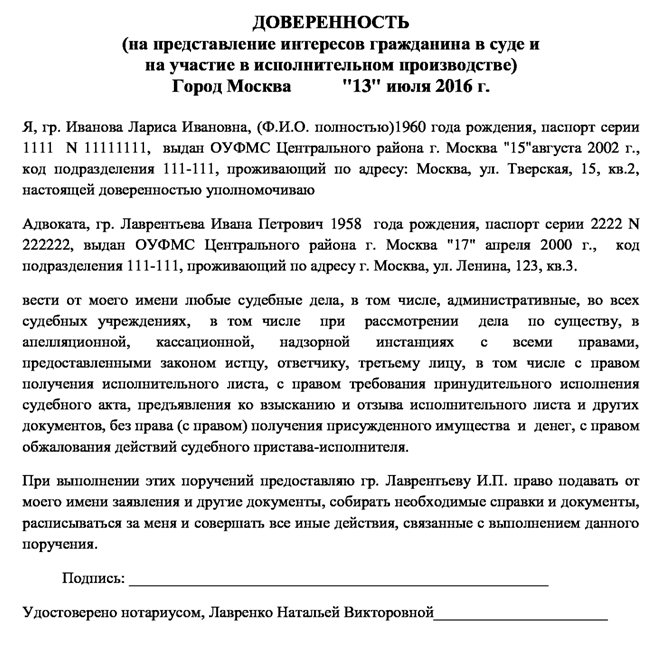
Source: moepravo.guru
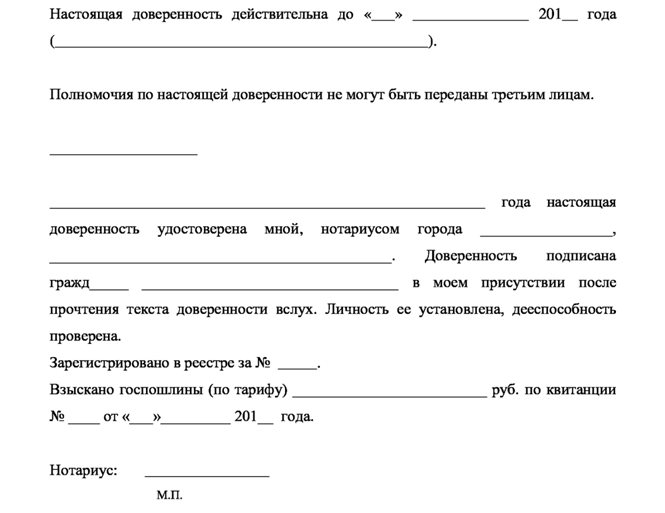
Source: potreb-prava.com
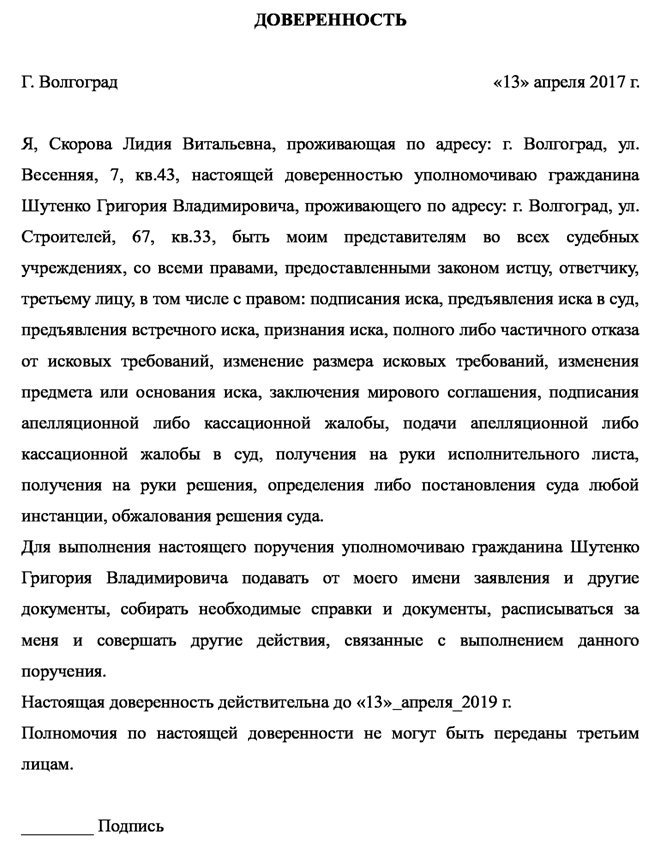
Source: iskiplus.ru
.
Trustees
Written authorization to represent the interests of an individual can be issued to an acquaintance, relative, group of citizens or legal entity.
If the representative is a group or one individual, they must have full legal capacity. That is, a power of attorney issued to a minor will be invalid.
An organization can only be trusted to perform any actions if it has the appropriate license.
The form and content of the order must comply with the requirements specified in:
- Article 185 of the Civil Code of the Russian Federation;
- Regulations for the performance of notarial acts by notaries, approved by Order of the Ministry of Justice of Russia dated August 30, 2017 No. 156.
In practice, there are often cases when a representative, for a number of reasons, is unable to perform the actions entrusted to him. If this is the case, the law provides the opportunity to resort to the transfer procedure.
The attorney is obliged to notify the person in whose interests the representation is being carried out about the fact of reassignment. The transfer of trust must be carried out in compliance with other rules specified in Art. 187 Civil Code of the Russian Federation.
When drawing up a power of attorney for a group of representatives, the text of the document must specify the powers of each. If a legal entity is appointed as a representative, its full name and organizational and legal form are reflected without indicating the division (branch, branch, etc.).
○ Differences between powers of attorney depending on their type
Powers of attorney can be classified according to different criteria:
- By type - one-time , special and general, they differ in the scope of powers transferred to the authorized person.
- By duration - one-time (for performing a one-time action) and long-term, when powers are retained for a certain time.
- By powers – general (general rights are indicated) and special (transfers exclusive powers).
Also, the power of attorney depends on the body to which it will be submitted and can be judicial, banking, postal, etc.
Persons authorized to certify documents
You need to know that a notary is not the only one who can certify a document, although most citizens think so. In addition to the notary, the law establishes other employees who have the right to do this:
- Heads of correctional institutions;
- Chief doctors at the hospital;
- Captains on the ship;
- Unit commanders.
If the form was certified by any of the above persons, then the document is no less valid than the one certified by the notary.
Features of notarization
In some cases, compliance with the written form of the document may not be enough. One of the reasons is the desire of the principal to protect his interests, the second is the mandatory requirements of the law.
Important! If the law requires notarization, then a regular power of attorney will not be considered valid.
An example of mandatory certification by a notary is a general power of attorney, which includes the right of subrogation.
In some cases, a power of attorney must be certified, but the citizen does not have the opportunity to contact a notary. Then the law allows another person to certify the validity of the expression of will.
Notarized power of attorney for representation of interests
How to draw up a general power of attorney from an individual for all powers, read here.
Do you need a power of attorney for a child in Russia? Read the link:
Legal norms provide a clear list of these persons:
- the head of a correctional system institution has the right to certify a power of attorney issued by a person deprived of liberty by a court verdict;
- the commander (chief) of a military unit has the right to certify powers of attorney for military personnel serving or undergoing training;
- the head of the hospital or hospital certifies the powers of attorney of persons staying for treatment in this medical institution.
In exceptional cases, the law provides for the possibility of certifying a document remotely. Not every organization has such powers; you need to check this in advance. The disadvantage of remote provision of services is the high cost.
Cost of certification by a notary
The price list for notary services may vary from organization to organization. However, the amount of state duty is the same for everyone and is established by law. It is regulated by the Tax Code of the Russian Federation and “Fundamentals of the legislation of the Russian Federation on notaries” dated February 11, 1993 N 4462-1. In addition to services that require payment of fees, the notary also provides technical services that require a separate fee.
Art. 333.24 of the Tax Code of the Russian Federation determines the total amount of state duty for notarial actions in relation to powers of attorney, equal to 200 rubles.
Please note! In addition to tax legislation, the cost of individual notary services is regulated by internal regulations.
We are talking about “Methodological recommendations for determining the maximum amount of fees for the provision of legal and technical services by a notary” (approved by the Decision of the Board of the FNP, minutes dated March 28, 2016 No. 03/16) and the Letter of the FNP dated November 17, 2016 No. 4341/03-16 -3 “On the application of certain provisions of the Procedure for determining the maximum amount of fees for the provision of UPiTH by notaries.” The amount of payment for notarization of citizens' powers of attorney is in some cases quite high.
For all subjects of the Russian Federation it has one scale:
- 1500 rub. – for powers of attorney transferring powers to dispose of a citizen’s property;
- 1200 rub. – in relation to transactions for which a notarial form is provided;
- 1200 rub. – for transactions where notarization is not necessary;
- 700-200 rub. – for powers of attorney relating to the representation of a citizen’s interests in court;
- 1400 rub. – for powers of attorney for the use and disposal of vehicles.
So, the average price of a notarized power of attorney is about 700-2000 rubles. Individual services may have different prices depending on the tariffs of a particular office.

